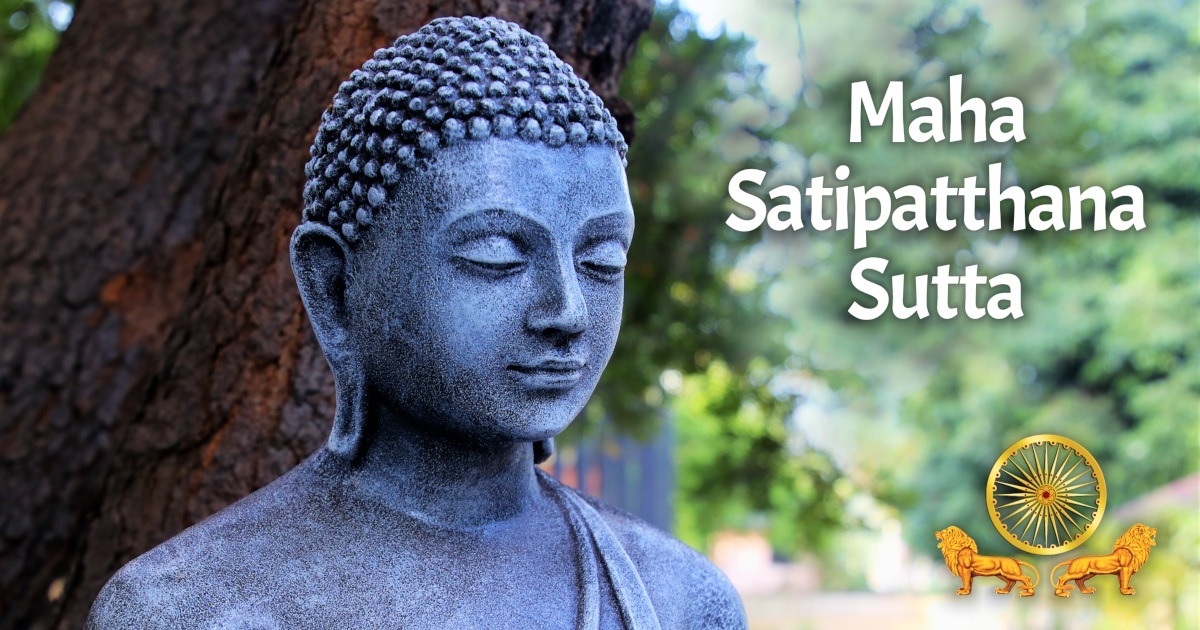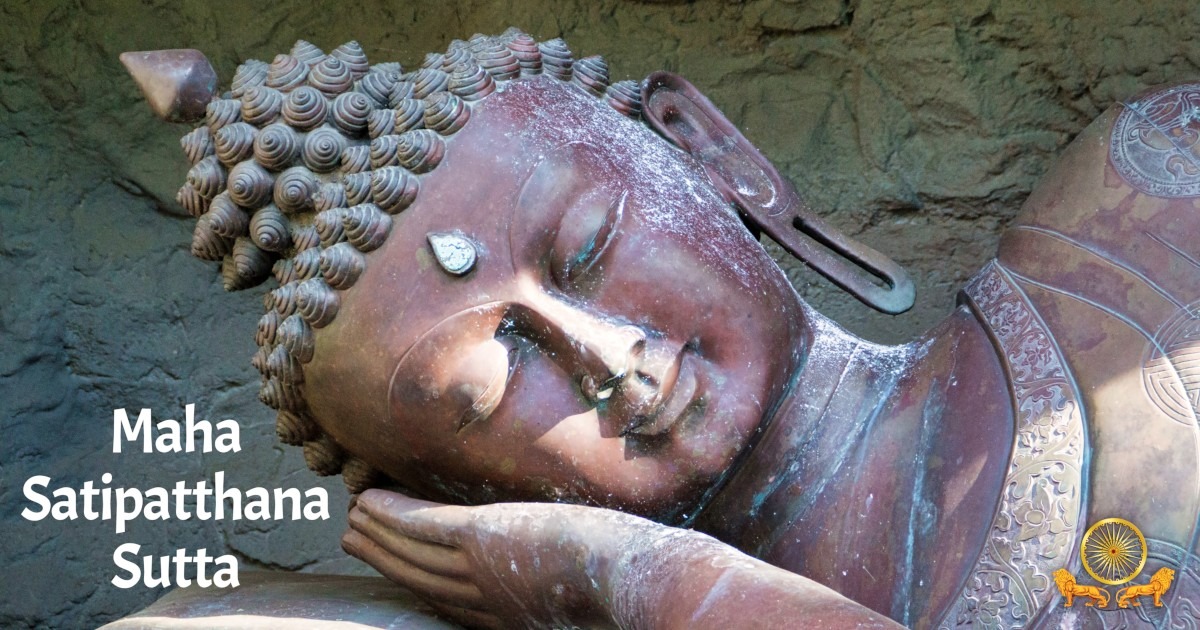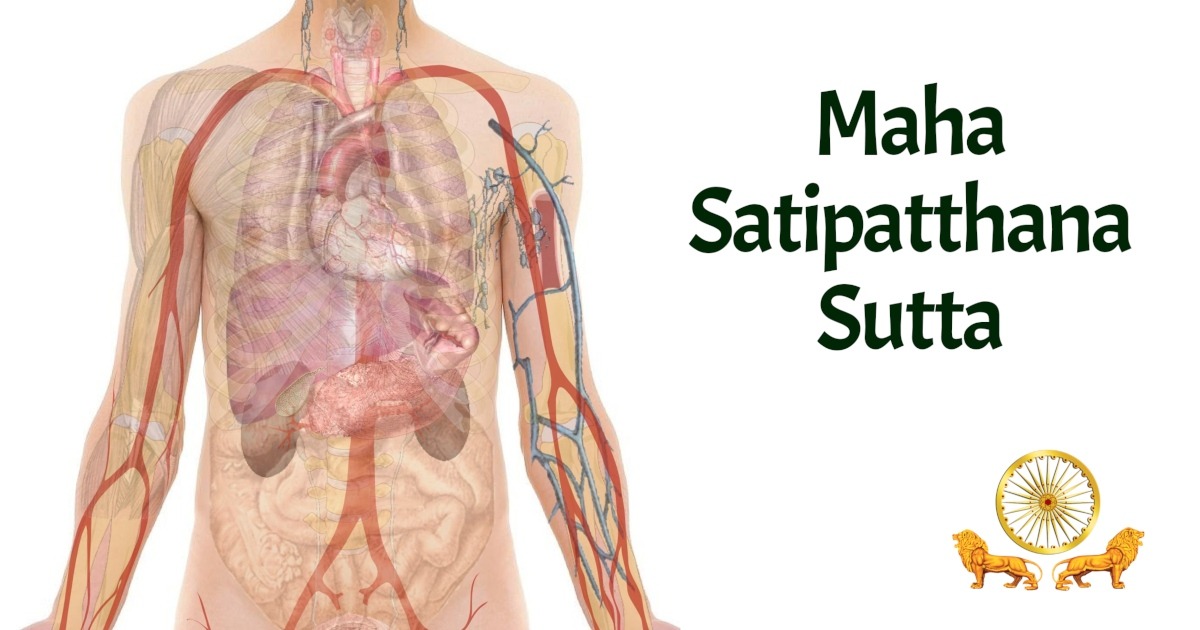2. Vedanānupassanā:
Contemplation of Feeling
Kathañca bhikkhave bhikkhu / vedanāsu vedanānupassī viharati?/
“And how, monks, does a monk dwell contemplating feelings in feelings?
Idha bhikkhave bhikkhu / sukhaṁ vedanaṁ vediyamāno,/ sukhaṁ vedanaṁ vediyāmī ti pajānāti,/
“Here monks, when feeling a pleasant feeling, a monk understands: • ‘I feel a pleasant feeling.’
Dukkhaṁ vā vedanaṁ vediyamāno,/ dukkhaṁ vedanaṁ vediyāmī ti pajānāti./
When feeling a painful feeling, he understands: • ‘I feel a painful feeling.’
Adukkhamasukhaṁ vā vedanaṁ vediyamāno,/ adukkhamasukhaṁ vedanaṁ vediyāmī ti pajānāti./
When feeling neither a painful nor pleasant feeling, he understands: • ‘I feel neither a painful nor pleasant feeling.’
Sāmisaṁ vā sukhaṁ vedanaṁ vediyamāno,/ sāmisaṁ sukhaṁ vedanaṁ vediyāmī ti pajānāti./
“When feeling a pleasant feeling based on the five sense objects; • forms, sounds, smells, tastes, and tangibles, • he understands it properly: • ‘I am feeling a wordly pleasant feeling.’
Nirāmisaṁ vā sukhaṁ vedanaṁ vediyamāno,/ nirāmisaṁ sukhaṁ vedanaṁ vediyāmī ti pajānāti./
When feeling a pleasant feeling through his spiritual practice, • he understands it properly: • ‘I am feeling a spiritual pleasant feeling.’
Sāmisaṁ vā dukkhaṁ vedanaṁ vediyamāno,/sāmisaṁ dukkhaṁ vedanaṁ vediyāmī ti pajānāti./
When feeling a painful feeling based on the five sense objects; • forms, sounds, smells, tastes, and tangibles, • he understands it properly: • ‘I am feeling a worldly painful feeling.’
Nirāmisaṁ vā dukkhaṁ vedanaṁ vediyamāno,/ nirāmisaṁ dukkhaṁ vedanaṁ vediyāmī ti pajānāti./
When feeling a painful feeling based on the lack of spiritual fruits, • he understands it properly: • ‘I am feeling a spiritual painful feeling.’
Sāmisaṁ vā adukkhamasukhaṁ vedanaṁ vediyamāno,/ sāmisaṁ adukkhamasukhaṁ vedanaṁ vediyāmī ti pajānāti./
When feeling a neither painful nor pleasant feeling • based on the five sense objects; • forms, sounds, smells, tastes, and tangibles, • he understands it properly: • ‘I am feeling a neither painful nor pleasant worldly feeling.’
Nirāmisaṁ vā adukkhamasukhaṁ vedanaṁ vediyamāno,/ nirāmisaṁ adukkhamasukhaṁ vedanaṁ vediyāmī ti pajānāti./
When feeling a neither painful nor pleasant feeling • through his spiritual practice • he understands it properly: • ‘I am feeling a neither painful nor pleasant spiritual feeling.’
Iti ajjhattaṁ vā vedanāsu vedanānupassī viharati,/ bahiddhā vā vedanāsu vedanānupassī viharati,/ ajjhatta bahiddhā vā vedanāsu vedanānupassī viharati./
“In this way he dwells contemplating feelings in feelings within himself, • he dwells contemplating feelings in feelings within another, • and he dwells contemplating feelings in feelings • both within himself and within another.
Samudaya dhammānupassī vā vedanāsu viharati,/ vaya dhammānupassī vā vedanāsu viharati,/ samudaya vaya dhammānupassī vā vedanāsu viharati./
“He dwells contemplating the arising of feelings, • he dwells contemplating the passing away of feelings, • and he dwells contemplating the arising and passing away of feelings.
Atthi vedanā ti vā panassa sati paccupaṭṭhitā hoti./ Yāvadeva ñāṇamattāya paṭissatimattāya./ Anissito ca viharati./ Na ca kiñci loke upādiyati./
“Mindfulness, that there is a feeling • is simply established in him • to the extent necessary for higher knowledge and mindfulness. He dwells independent, and not clinging to anything in the world.
Evampi kho bhikkhave bhikkhu / vedanāsu vedanānupassī viharati./
That is how monks, a monk dwells contemplating feelings in feelings.
(The section on contemplating feelings in feelings is finished.)
- Uddeso: Introduction
- 1. Kāyānupassanā: The Observation of Body
- 1.1 Ānāpāna Pabbaṁ: Section on Breathing
- 1.2. Iriyāpatha Pabbaṁ: Section on Postures
- 1.3 Sampajañña Pabbaṁ: Section on Clear Comprehension
- 1.4 Paṭikūlamanasikāra Pabbaṁ: Section on Repulsiveness
- 1.5 Dhātumanasikāra Pabbaṁ: Reflections on the Elements
- 1.6 Navasīvathika Pabbaṁ: Nine Charnel-Ground Contemplations
- 2. Vedanānupassanā: Contemplation of Feeling
- 3. Cittānupassanā: Contemplation of Mind
- 4. Dhammānupassanā: Contemplation of Phenomena
- 4.1 Nīvaraṇa Pabbaṁ: Section on the Hindrances
- 4.2 Khandha Pabbaṁ: Section on the Aggregates
- 4.3 Āyatana Pabbaṁ: Section on the Sense Bases
- 4.4 Bojjhanga Pabbaṁ: Section on the Factors of Enlightenment
- 4.5 Sacca Pabbaṁ: Section on the Four Noble Truths
- Satipaṭṭhāna Bhāvanānisaṁso: The Results of the Establishing of Mindfulness

Learn how to purchase on the main book page.




















Leave A Comment